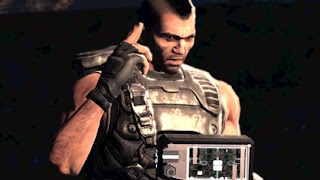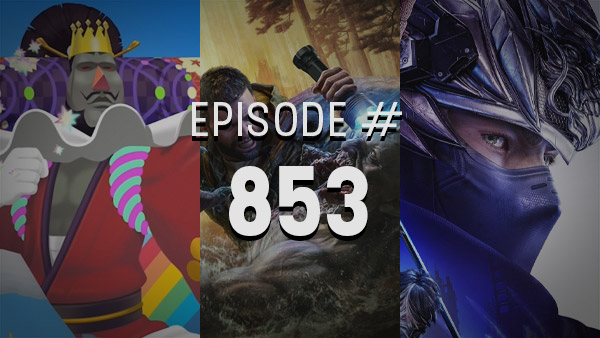Your login information returned multiple users. Please select the user you would like to log in as and re-type in your password.
 Telling a good story is something that Video Games have not done too well. There are the occasional gems that treat players to very rewarding and fleshed out story lines but then again, some games set out to tell a simple story that may not be necessarily deep but entertaining none the less. For the past year, I have sat by on the podcast as Brad barrages me with seemingly endless Turok and Bourne jokes. I played these games. I enjoyed them for what they were. I'm not ashamed and i'm definitely not alone. However, whenever the topic of story comes up on our show, these games come up as the butt of Brad's joke. This article is written in their defense because while they may not be the deepest story lines, they are not throw away and they have earned a place on my shelf for several reasons.
Telling a good story is something that Video Games have not done too well. There are the occasional gems that treat players to very rewarding and fleshed out story lines but then again, some games set out to tell a simple story that may not be necessarily deep but entertaining none the less. For the past year, I have sat by on the podcast as Brad barrages me with seemingly endless Turok and Bourne jokes. I played these games. I enjoyed them for what they were. I'm not ashamed and i'm definitely not alone. However, whenever the topic of story comes up on our show, these games come up as the butt of Brad's joke. This article is written in their defense because while they may not be the deepest story lines, they are not throw away and they have earned a place on my shelf for several reasons.  The gap between games and cinema is narrowing slowly but surely. Developers are trying harder to tell stories that are full of mystery, intrigue, humor, and character development in a way that compliments the game play in the best way possible. Obviously, finding a happy medium between game play and storytelling is a challenge. Certain genres like RPG's and survival horror lend themselves very well to storytelling and actually depend rather heavily on it to sell units. Other genres such as shooters, platfomers, and puzzle games make it a bit more challenging for a number of reasons.
The gap between games and cinema is narrowing slowly but surely. Developers are trying harder to tell stories that are full of mystery, intrigue, humor, and character development in a way that compliments the game play in the best way possible. Obviously, finding a happy medium between game play and storytelling is a challenge. Certain genres like RPG's and survival horror lend themselves very well to storytelling and actually depend rather heavily on it to sell units. Other genres such as shooters, platfomers, and puzzle games make it a bit more challenging for a number of reasons.
The game play in RPG and horror titles is a much slower pace and is often a much more drawn out experience. In a 20 - 50 hour game, players need something else besides game play to keep them coming back for more. Fitting an interesting narrative into the fray gives players purpose in the universe. You can't deny that one of the greatest aspects of a games like Final Fantasy VII, Chrono Trigger, and Resident Evil were their story. Despite their fantastic game play and game design, the characters and conflicts within their story made them truly memorable.
I enjoyed Turok because while it was still a bloody shooter at it's core, it presented players with an interesting character with an intriguing past. Sure, none of the characters had any real depth, but the conflict between Turok and his rogue mentor was enough to keep me moving forward. Also, I have always been a sucker for a good cutscene and I think the rendered cut-scenes and ATB sequences were well done and made the game interesting to watch. Without those sequences, this game would have simply been a lame dino hunting sim. So in Turok's defense, the game was about as good as a weekend, blockbuster action movie and as far as I am concerned, there is nothing wrong with that. That genre has a place in the movie industry so why can't it exist in the gaming world? While I did enjoy Turok (& Bourne) it also made me think a lot about what the genre was missing as well.  Devils Advocate: First of all, the demographic that shooters target don't seem to really care about story or motivation. I don't mean to lump anyone into this category but from personal experience, many people simply pick up a shooter because they like to cause chaos and destruction. As long as those elements are present in the game, they are happy. Many developers seem that they would rather throw in a decent enough story as a backdrop and then focus primarily on game play. Why is it though, that a game designed around the concept of war and survival doesn't feel the need to motivate or justify murder? I'm still waiting for a shooter that provides me with an emotional drive to fight a war. I want to be bombarded with horrendous imagery that makes me WANT to pick up a gun and fight for something. The closest I have come to that feeling was in Call of Duty 4 but the game still lacked a real connection with the characters. Infinity Ward was definitely on the right track but I doubt we will ever see a shooter with the same quality narrative of a game like Mass Effect or Final Fantasy.
Devils Advocate: First of all, the demographic that shooters target don't seem to really care about story or motivation. I don't mean to lump anyone into this category but from personal experience, many people simply pick up a shooter because they like to cause chaos and destruction. As long as those elements are present in the game, they are happy. Many developers seem that they would rather throw in a decent enough story as a backdrop and then focus primarily on game play. Why is it though, that a game designed around the concept of war and survival doesn't feel the need to motivate or justify murder? I'm still waiting for a shooter that provides me with an emotional drive to fight a war. I want to be bombarded with horrendous imagery that makes me WANT to pick up a gun and fight for something. The closest I have come to that feeling was in Call of Duty 4 but the game still lacked a real connection with the characters. Infinity Ward was definitely on the right track but I doubt we will ever see a shooter with the same quality narrative of a game like Mass Effect or Final Fantasy.
Hopefully, someone will prove me wrong.




Comments